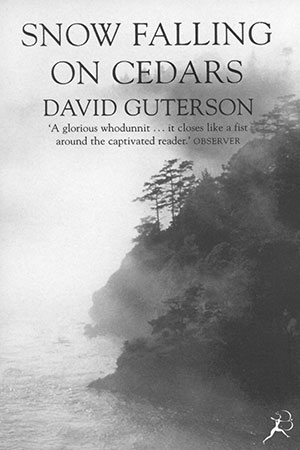The accused man, Kabuo Miyamoto, sat proudly upright with a rigid grace, his palms placed softly on the defendant’s table – the posture of a man who has detached himself insofar as this is possible at his own trial. Some in the gallery would later say that his stillness suggested a disdain for the proceedings; others felt certain it veiled a fear of the verdict that was to come. Whichever it was, Kabuo showed nothing – not even a flicker of the eyes. He was dressed in a white shirt worn buttoned to the throat and gray, neatly pressed trousers. His figure, especially the neck and shoulders, communicated the impression of irrefutable physical strength and of precise, even imperial bearing. Kabuo’s features were smooth and angular; his hair had been cropped close to his skull in a manner that made its musculature prominent. In the face of the charge that had been leveled against him he sat with his dark eyes trained straight ahead and did not appear moved at all.In the public gallery every seat had been taken, yet the courtroom suggested nothing of the carnival atmosphere sometimes found at country murder trials. In fact, the eighty-five citizens gathered there seemed strangely subdued and contemplative. Most of them had known Carl Heine, a salmon gill-netter with a wife and three children, who was buried now in the Lutheran cemetery up on Indian Knob Hill. Most had dressed with the same communal propriety they felt on Sundays before attending church services, and since the courtroom, however stark, mirrored in their hearts the dignity of their prayer houses, they conducted themselves with churchgoing solemnity.
This courtroom, Judge Llewellyn Fielding’s, down at the end of a damp, drafty hallway on the third floor of the Island County Courthouse, was run-down and small as courtrooms go. It was a place of gray-hued and bleak simplicity – a cramped gallery, a bench for the judge, a witness stand, a plywood platform for the jurors, and scuffed tables for the defendant and his prosecutor. The jurors sat with studiously impassive faces as they strained to make sense of matters. The men – two truck farmers, a retired crabber, a bookkeeper, a carpenter, a boat builder, a grocer, and a halibut schooner deckhand – were all dressed in coats and neckties. The women all wore Sunday dresses – a retired waitress, a sawmill secretary, two nervous fisher wives. A hairdresser accompanied them as alternate.
The bailiff, Ed Soames, at the request of Judge Fielding, had given a good head of steam to the sluggish radiators, which now and again sighed in the four corners of the room. In the heat they produced – a humid, overbearing swelter – the smell of sour mildew seemed to rise from everything.
